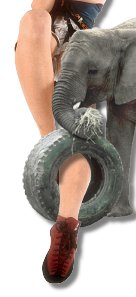Leg Pain
July 26, 2000
Each issue, Q Fever! presents a challenging clinical conundrum to test readers' problem-solving skills and illustrate bread-and-butter medical principles. Good luck!
A 35 year old man presents to Medical Walk-In Clinic with the chief complaint of leg pain for 3 weeks.
At the time of onset of symptoms, he had been vacationing in Belize for approximately one month when he noted a slow but progressive increase in left lower extremity discomfort.
In addition, the patient notes an increasing sensation of extreme left leg "heaviness," which prevented him from walking without assistance.
Other than these symptoms, he feels "well," and cannot recall any specific injury to the leg.
On exam, the patient is well-developed and well-nourished, and appears in no apparent distress.
Vital signs are unremarkable.
Head & neck, throat, lungs, heart, abdomen, and neuro exam are all within normal limits.
A close inspection of his lower extremities reveals the following:

What's going on?
Answer:
Elephantiasis
Although a subtle finding, the presence of an elephant dangling a tire from its trunk through which the patient's left lower extremity is extended suggests strongly the diagnosis of elephantiasis.
This condition, caused by the organism Wucheria bancrofti, not uncommonly affects travelers to regions of the world in which elephants live in the wild with tires dangling from their trunks.
Because elephantiasis is often mistaken for cellulitis or lymphedema, for which treatment is markedly dissimilar, it is extremely important to always inquire about a travel history when investigating unilateral leg pain and heaviness, as well as to check for the presence of a large pachyderm in or near the patient's vicinity.
In this patient's case, a three-week course of antibiotics could have been prevented had the initial clinical investigation noted the presence of the elephant, its trunk, or the tire dangling from it.
With the proper treatment of bed rest, fluids, and ibuprofen, the condition resolves on its own within one week, with no residual damage to either the patient, or to the elephant, trunk, or tire.
More Stuff!
Get the Q Fever! Book!
The Q Fever! Store!: T-shirts, caps, mugs, and thongs!
Support The Q!
Subscribe to the Q Fever! Mailing List!
Contact Q Fever!
Remember: Quality Without The Q Is Just Uality!
Menu

